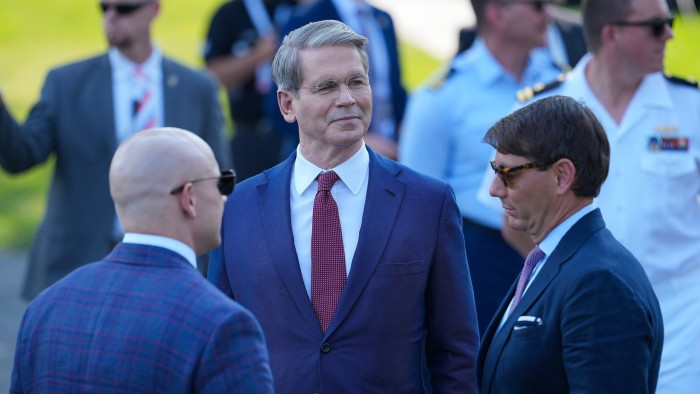Unlock the White House Watch newsletter for free
Your guide to what Trump’s second term means for Washington, business and the world
Scott Bessent has warned that US tariffs on imports from some countries will “boomerang” back to the steep levels set by Donald Trump in April unless they quickly offer concessions and strike deals with Washington.
The US Treasury secretary’s comments came ahead of Wednesday’s end to a 90-day pause in the higher levies which has helped soothe markets and left room for talks between the US and its top commercial partners.
However, Trump has so far only struck three trade pacts during this period — with the UK, China and Vietnam — leaving the rest of the global economy, including top US allies such as the EU, Japan and South Korea, in limbo and facing renewed threats of high tariffs.
Speaking to CNN on Sunday, Bessent said Trump would inform countries that failed to reach agreements with the US that higher levies on their imports would take effect next month, a plan the president had floated last week.
“I’m not going to give away the playbook. We’re going to be very busy over the next 72 hours,” Bessent said. “President Trump is going to be sending letters to some of our trading partners saying that if you don’t move things along, then on August 1st, you will boomerang back to your April 2nd tariff level.”
Bessent said he expected Trump’s approach would lead to a flurry of dealmaking with top trading partners, but that about “100 letters” would also be going out to smaller countries with little US trade, setting their tariffs at 10 per cent.
Speaking to ABC on Sunday, Stephen Miran, chair of the White House council of economic advisers, said he was hearing “good things” about the negotiations with Europe and India. “The president will decide later this week, and in the time following, whether or not the countries are doing what it takes to get access to the American market like they’ve grown accustomed to,” Miran said.
The Trump administration’s initial pause on the higher levies three months ago was forced by a fiercely negative reaction from both US equity and bond investors, who feared that American ultra-protectionism would lead to both slower growth, if not a recession, and higher inflation. However, after Trump U-turned on the higher levies, equity markets rebounded strongly while bond markets eventually stabilised.
The possibility of a rapid return to exceedingly high tariffs on many countries could reignite those concerns, but investors have shown signs of adjusting to Trump’s trade regime of on-and-off negotiations with most big countries. Meanwhile, economic data has been relatively benign, with the labour market holding up in the first months of the administration, and inflation not showing signs of rapid re-acceleration because of the tariffs.
The trade talks that will dominate the coming weeks follow a period when Trump’s attention has mostly been on passage of his signature domestic policy bill — a package of tax cuts, spending reductions to the social safety net, and new funding to crack down on immigration. With that legislation passed by Congress and then signed by Trump on Friday, the White House focus can shift back to trade and tariffs.



